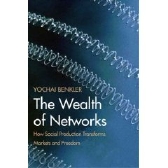 I was lucky enough to have a chance to be at The Wealth of Networks: How Social Production Transforms Markets and Freedom book launch at Eyebeam in NYC last week. After a short introduction by Jonah Peretti, Yochai Benkler got up and gave us his presentation. The talk was really interesting, covering the basic ideas in his book and delivered with the energy and clarity of a true believer. We are, he says, in a transitional period, during which we have the opportunity to shape our information culture and policies, and thereby the future of our society. From the introduction:
I was lucky enough to have a chance to be at The Wealth of Networks: How Social Production Transforms Markets and Freedom book launch at Eyebeam in NYC last week. After a short introduction by Jonah Peretti, Yochai Benkler got up and gave us his presentation. The talk was really interesting, covering the basic ideas in his book and delivered with the energy and clarity of a true believer. We are, he says, in a transitional period, during which we have the opportunity to shape our information culture and policies, and thereby the future of our society. From the introduction:
This book is offered, then, as a challenge to contemporary legal democracies. We are in the midst of a technological, economic and organizational transformation that allows us to renegotiate the terms of freedom, justice, and productivity in the information society. How we shall live in this new environment will in some significant measure depend on policy choices that we make over the next decade or so. To be able to understand these choices, to be able to make them well, we must recognize that they are part of what is fundamentally a social and political choice—a choice about how to be free, equal, productive human beings under a new set of technological and economic conditions.
During the talk Benkler claimed an optimism for the future, with full faith in the strength of individuals and loose networks to increasingly contribute to our culture and, in certain areas, replace the moneyed interests that exist now. This is the long-held promise of the Internet, open-source technology, and the infomation commons. But what I’m looking forward to, treated at length in his book, is the analysis of the struggle between the contemporary economic and political structure and the unstructured groups enabled by technology. In one corner there is the system of markets in which individuals, government, mass media, and corporations currently try to control various parts of our cultural galaxy. In the other corner there are individuals, non-profits, and social networks sharing with each other through non-market transactions, motivated by uniquely human emotions (community, self-gratification, etc.) rather than profit. Benkler’s claim is that current and future technologies enable richer non-market, public good oriented development of intellectual and cultural products. He also claims that this does not preclude the development of marketable products from these public ideas. In fact, he sees an economic incentive for corporations to support and contribute to the open-source/non-profit sphere. He points to IBM’s Global Services division: the largest part of IBM’s income is based off of consulting fees collected from services related to open-source software implementations. [I have not verified whether this is an accurate portrayal of IBM’s Global Services, but this article suggests that it is. Anecdotally, as a former IBM co-op, I can say that Benkler’s idea has been widely adopted within the organization.]
Further discussion of book will have to wait until I’ve read more of it. As an interesting addition, Benkler put up a wiki to accompany his book. Kathleen Fitzpatrick has just posted about this. She brings up a valid criticism of the wiki: why isn’t the text of the book included on the page? Yes, you can download the pdf, but the texts are in essentially the same environment—yet they are not together. This is one of the things we were trying to overcome with the Gamer Theory design. This separation highlights a larger issue, and one that we are preoccupied with at the institute: how can we shape technology to allow us handle text collaboratively and socially, yet still maintain an author’s unique voice?
